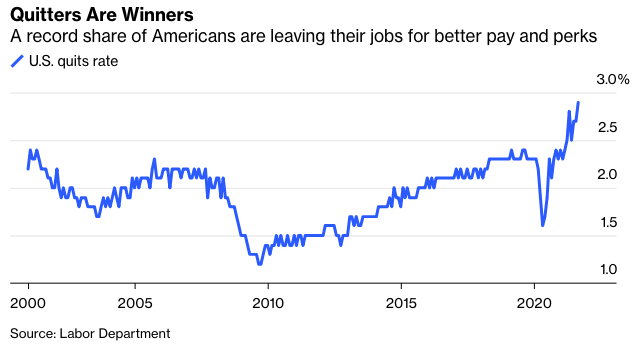It’s not quite Wall Street’s version of the “Great Resignation” — but it’s not too far off, either.
JPMorgan Chase & Co.’s equity derivatives desk has faced a wave of defections this year, part of a growing trend across the financial industry, Bloomberg News’s Hannah Levitt reports. Unlike many Americans leaving their jobs, JPMorgan’s senior executives had positions lined up at rival powerhouses like Bank of America Corp., Citigroup Inc. and Millennium Management. But, like workers in other industries, bankers are increasingly basing their career decisions on more than just money. After more than a year of the Covid-19 pandemic, flexible lifestyles are in demand.
This nationwide trend is reflected most prominently in the “quits rate,” a measure of employee-initiated job separations that’s part of the Job Openings and Labor Turnover Survey. It reached a record high 2.9% in August, compared with 2.3% at the start of 2020, when many economists considered the U.S. at a level consistent with maximum employment. The jump reflects ample confidence among job-seekers that they can find appealing positions elsewhere. The latest Jolts data will be released on Friday.

Crucially, the quits rate is also a key indicator of U.S. labor market strength. “Wages is a key measure of how tight the labor market is. The level of quits. The amount of job openings,” Federal Reserve Chair Jerome Powell said at a press conference last week. “Quits and job openings and wages and things, many of them are signaling a tight labor market, but the issue is, how persistent is that?”
The fact that JPMorgan and other Wall Street institutions aren’t immune to greater turnover at their highest ranks is good reason to think the tightness is quite persistent. It’s been clear for a while that with job openings at near-record highs, including among restaurants and other front-line industries, employers have had to offer higher wages and bonuses to attract candidates who might otherwise rather wait out the pandemic. Hourly workers in the leisure and hospitality industry saw earnings jump by 12.4% in October relative to a year earlier, for instance, according to Labor Department data.
The top ranks of the financial industry are outpacing even that robust wage growth:
For now, industry veterans examining their options have found they have more alternatives than before. A growing number of financial-technology companies, crypto-currency ventures and so-called blank-check companies are interested in enlisting their experience.
So how much can a banker get by jumping ship? It depends.
The standard bump of at least 10% that executives could expect by defecting to a competitor has probably doubled, said Robert Voth, managing director at executive search firm Russell Reynolds Associates.
At least in the context of the broader labor market, this is perhaps the most critical line from Levitt’s reporting:
An industry veteran said moves are becoming so common that some people left behind are anxious: Are they making a mistake by staying?








